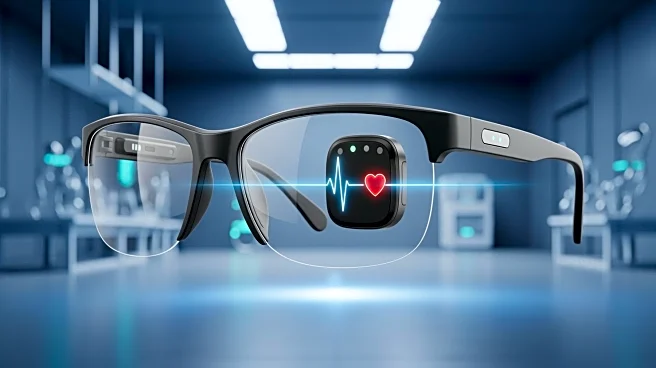What's Happening?
Meta has introduced the Aria Gen 2 augmented reality headset, equipped with a PPG heart-rate sensor and a contact microphone, aimed at enhancing research capabilities. This new device allows labs to capture physiological signals alongside eye and hand
tracking, transforming AR research from observational to physiological measurement. The headset, weighing 75 grams and offering up to 8 hours of battery life, facilitates longer field studies. The addition of biometric sensing capabilities is expected to accelerate wearable AI adoption, enabling researchers to analyze stress, attention, and health signals without separate wearables. This development raises significant privacy and consent questions, as labs must now consider how to handle health data from eyewear at scale.
Why It's Important?
The introduction of biometric sensing in AR headsets like the Aria Gen 2 marks a significant shift in research methodologies, allowing for more comprehensive data collection. This advancement could lead to faster prototyping for studies related to accessibility, mental health, and attention tracking. However, it also necessitates updates to consent forms and privacy protocols to address continuous physiological data capture. Institutional Review Boards and corporate privacy teams will need to adapt to these changes, ensuring that subjects' rights are protected. The move by Meta signals a broader industry trend, with major players like Apple and Google also pushing smart-glasses designs, indicating a competitive race in the wearable technology sector.
What's Next?
As the Aria Gen 2 becomes available to academic and commercial labs, there will likely be increased demand for secure biometric data pipelines. Institutions will need to establish rules for handling physiological AR data, balancing research advancements with ethical considerations. Researchers and privacy advocates will be closely monitoring how these new capabilities are implemented, potentially influencing future regulations and standards in the field of wearable technology. The industry may see a surge in vendor requests for solutions that ensure data security and subject consent, shaping the future landscape of AR research.
Beyond the Headlines
The integration of biometric sensors in AR devices like the Aria Gen 2 could lead to long-term shifts in how research is conducted, potentially influencing the development of new technologies for health monitoring and personal data management. Ethical considerations surrounding data privacy and consent will become increasingly important as these devices become more prevalent in research settings. The ability to capture continuous physiological data may also open new avenues for personalized healthcare solutions, driving innovation in both the tech and medical industries.















